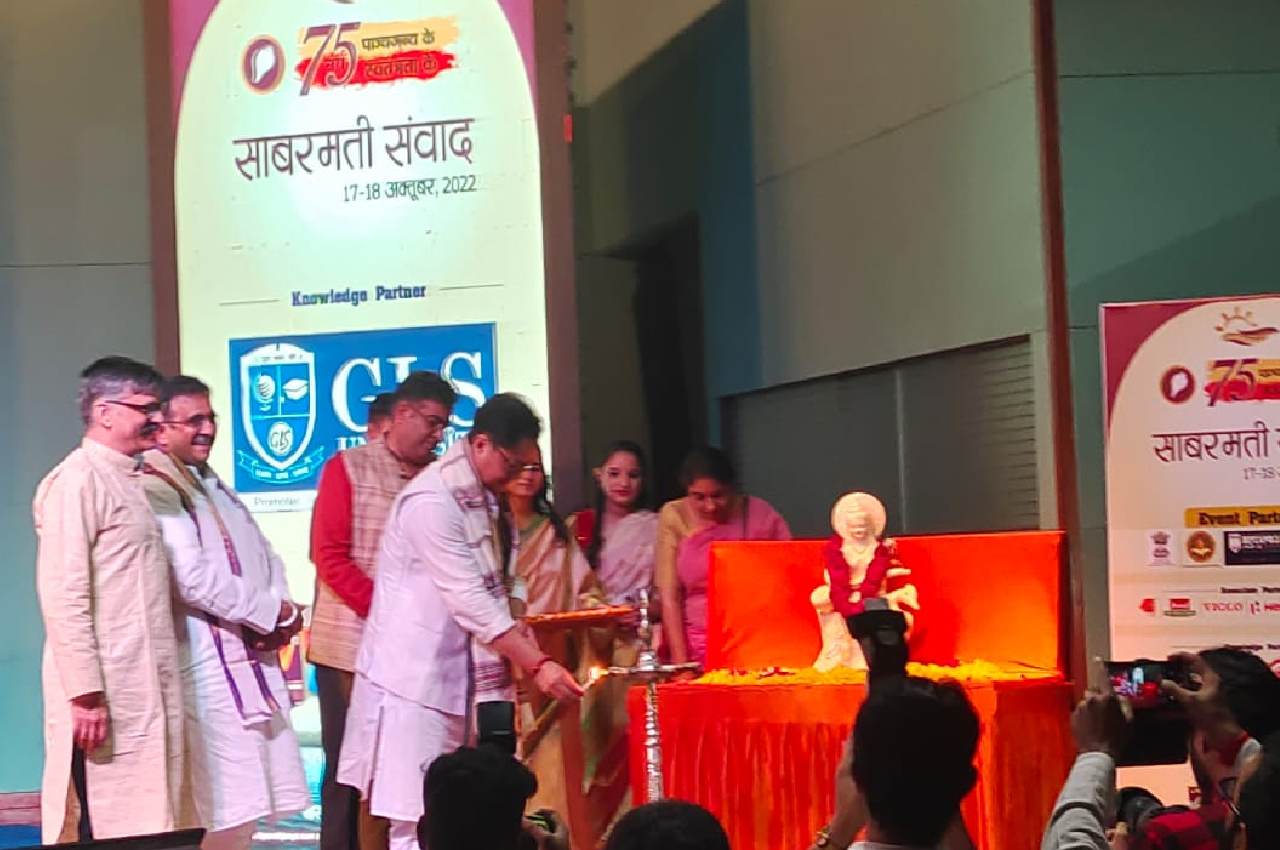New Delhi: Emphasizing the need for reforms in judicial appointments, Union Law Minister Kiren Rijiju has said the procedure of the Collegium system is very opaque and there exists “internal politics” in the Judiciary.
Kiren Rijiu was speaking at ‘Sabarmati Samvad’
Speaking at ‘Sabarmati Samvad’, an event organized by Rashtriya Swayamsevak Sangh (RSS) weekly magazine ‘Panchjanya’ here on Monday, the Union Minister said, “The Constitution is the most sacred document. We have three pillars including legislature, executive and judiciary… I feel the executive and legislature are bound in their duties and the judiciary improves them. But the issue is that when the judiciary goes astray, there is no system to improve them.”
Rijiju said India has a vibrant democracy and sometimes appeasement politics can also be observed. He said the Bharatiya Janata Party (BJP) government never undermined or challenged the Judiciary.
‘Objections against judicial observations in society’
On judicial activism, the Minister said, “When we brought the National Judicial Appointment Commission, it was challenged and the Supreme Court struck it down. If there is no system to regulate the judiciary then the term judicial activism is used. Many of the judges have observations but those do not include part of their order. They express their thoughts through observations. There are also objections against these observations in society. It would be good if judges give their observations through their orders.”
Rijiju said he observed that on several occasions judges go beyond the limit of duties and tend to do executive functions without knowing the ground realities.
“When the judiciary goes beyond its limits…Judges are not aware of the practical difficulties or the financial conditions. It will be good if people remain focused on their respective duties. Otherwise, people may also say that we are doing executive activism,” the Law Minister said.
CJI was made after surpassing 3 senior judges in Indra’s tenure
Referring to former Prime Minister Indira Gandhi’s tenure, Rijiju said the CJI was made after surpassing three senior judges. He said the Modi government does not indulge in such actions.
“We did not do such kind of things. Now if we take some steps to regulate the judiciary those people allege that we want to control or influence the judiciary or create obstruction in the appointment of judges,” he said.
Rijiju called for a self-regulatory mechanism within the Judiciary to regulate the conduct of judges.
Judiciary should have a self-regulatory mechanism
Asked about if the judiciary is beyond the limits of positive criticism, Rijiju said, “Be it a parliamentarian or judge, they have a privilege. There is a code of ethics in Parliament. But in the case of the Judiciary, there is no such mechanism. There should be a self-regulatory mechanism within the judiciary for the conduct of judges.”
He said in the era of social media and live streaming of court procedures, it is normal that people would judge the judges.
“I cannot order the judiciary. I just want to caution the judiciary that they are part of the democracy, people are watching them so their behaviour should be accordingly,” Rijiju said.
“Till 1993, judges were appointed by the government in consultation with the Chief Justice of India. At that time we had very eminent judges. After 1993, the Supreme court defined the ‘consultation’ as concurrence. In no other field, consultation has been defined as concurrence but in judicial appointments,” he added.
Nowhere in the world judges appoint judge
Notably, the Supreme Court Collegium is presided over by the Chief Justice of India and consists of the four senior-most judges of the court. Though the government can raise objections or seek clarifications with respect to the recommendations of the Collegium, the government is bound to approve the names if the five-member body reiterates them.
He said as per the spirit of the Constitution, appointing judges is the job of the government
Rijiju said, “Supreme Court expanded the collegium system in 1998. Nowhere in the world judges make appointments of judges. The primary duty of judges is the delivery of justice.”
The Minister said he has observed that half the time judges are busy deciding appointments, thereby affecting their primary job of “delivering justice”.
‘Judges spend time in appointing judges instead of delivering justice’
“Now I have observed that more than half of the time, judges spend time in appointing judges instead of delivering justice. The internal politics of the Judiciary is not seen from the outside. There are intense deliberations. Sometimes even groupism also happens. The procedure is very opaque, and not transparent. If judges play the executive role, then it would be reviewed,” Rijiju said.
Before 1993, he said no finger was raised or there was criticism towards judges since they were not associated with the appointments.
Rijiju said the Chief Justice of India (CJI) has written to him about the “attacks” on the judiciary on social media, saying these should be controlled and strict action should be taken by the government.
“CJI wrote to me against the attack on the judiciary on social media. He sought control over this. I did not give my reply deliberately. If we give a reply then we need to move ahead,” the Law Minister said.
Judiciary has influence of 200 years of British rule
He further said India’s Judiciary is the colonial system and there is the influence of the 200 years of British rule over it.
“I will consult with CJI about whether we continue to follow the British dress code or use clothes according to our environmental conditions and culture,” he said.
Rijiju further said there is the dominance of a group of lawyers in the Supreme Court who even threaten the judges.
“In the Supreme court, there are 50-60 lawyers who even threaten the judges,” he said.
In 2014, the National Democratic Alliance government brought the National Judicial Appointments Commission (NJAC) Act in an attempt to change the system of appointment of judges.
The NJAC was a proposed body, which would have been responsible for the appointment and transfer of judges to the higher judiciary. The NJAC Act and the Constitutional Amendment Act came into force on April 13, 2015. But the top court on October 16, 2015, struck down the NJAC Act. The verdict brought back the primacy of the collegium system of judges appointing judges.
Updated By













